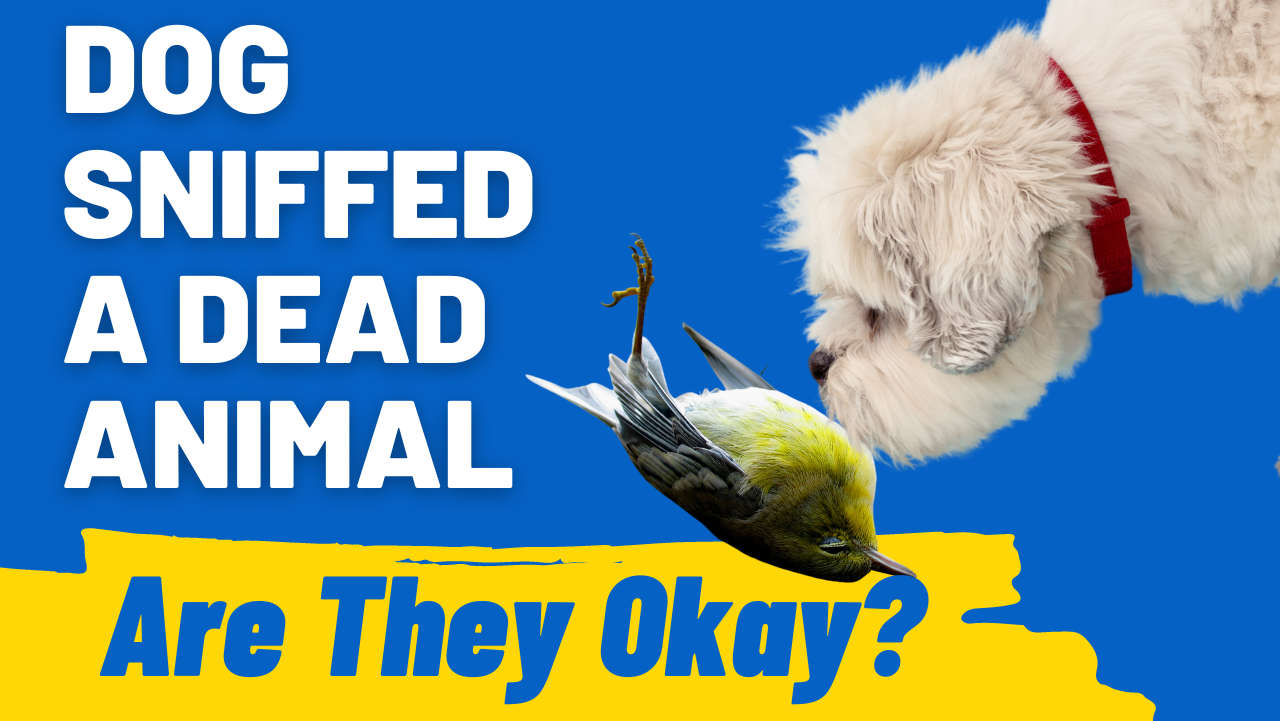The thought of your dog being anywhere near a dead animal, let alone sniffing or licking it, may sound dreadful. To your dog, however, the scent of a dead animal is intriguing.
Dogs’ acute sense of smell played a crucial evolutionary role in their ancestors’ survival. Even now, their sense of smell helps them gather information about their surroundings.
That’s why, if your dog comes across a dead animal, they’re likely to sniff it, lick it, and even pick it up!
In this post, we’ll walk you through what to do if your dog sniffed a dead bird, rat, or other animal, as well as how to clean their mouth after they drop it. Before we do so, however, let’s take a look at what licking or sniffing a dead animal can do to a dog…
Can Dogs Get Sick From Licking a Dead Bird, Rat, or Animal?
The chances of your dog getting sick from licking a dead animal are slim. That said, a dead animal, such as a squirrel, rabbit, or mouse, may carry bacteria, parasites, or toxins that can seriously harm your dog.
So, if your dog’s tongue comes into contact with an open wound, body fluids, or feces, he’s more likely to contract an infection or disease. The chances are even higher if the dead animal has a toxin on its body.

Infections and Illnesses
Most bacteria, viruses, and parasites that cause illness can be found inside a dead animal’s body. So, the risk of contracting an infection or disease is higher if your dog picks up or eats the dead animal.
Still, infected animals can spread their illnesses via saliva, blood, urine, or feces. Licking a dead squirrel, for example, can expose your dog to coccidiosis or leptospirosis. If a dog licks any of these secretions on a dead squirrel’s body, the dog is likely to become sick.
Dead bird and animal carcasses may also carry botulism, a bacterial neurotoxin. This illness is dangerous as it can cause a rapid onset of paralysis.
In addition, rats, mice, and birds can carry toxoplasmosis. Dogs usually contract this parasite by ingesting infected feces. So, if a dog’s tongue comes into contact with a dead animal’s feces, he can become infected.
Each infection and illness may have its unique symptoms. However, there are some common symptoms to look out for after your dog licks a dead animal, such as:
- Poor appetite
- Lethargy
- Diarrhea
- Vomiting
- Abdominal pain
- Dehydration
- Spasms or tremors
In some cases, your dog may not show any physical or behavioral changes after licking a dead animal. We still recommend contacting your vet to ensure that your pup is in good health.
Poisoning
Secondary poisoning is more likely to happen if your dog eats an animal that died from ingesting poison, pesticides, or environmental toxins. However, licking can also cause secondary poisoning in your dog if the dead animal has an open wound or the toxin is still on its body.
Luckily, in most cases, licking a dead animal won’t expose your dog to enough poison to be life-threatening. Even so, your dog may experience some poisoning symptoms, such as vomiting and diarrhea.
Alternatively, the dead animal itself can be poisonous or venomous. Their toxins take time to break down, and they’re only safe once completely decomposed. So, if a dog licks a poisonous dead animal, he’s likely to suffer from poisoning.
The amount of toxin that sticks to the insides of the dog’s mouth determines the severity of the symptoms, which include:
- Excessive salivation
- Slimy gums
- Vomiting
- Rapid heart rate
- Pawing at the mouth
- Tremors, spasms, or convulsions
Intestinal Blockage
If your dog eats a dead animal, he may develop an intestinal blockage. Although a dog’s digestive system can usually handle bones, some bones can still cause bowel obstruction. This condition, if left untreated, can lead to intestinal puncture and be life-threatening.
In this case, you need to take your dog to the vet for a physical examination if you notice any of the following symptoms:
- Loss of appetite
- Straining or unable to poop
- Whining
- Bloating
- Painful abdomen to the touch
Can Sniffing a Dead Animal Make My Dog Sick?

Dogs are unlikely to get sick from sniffing or nosing at a dead animal, even if it’s rotten. Smells don’t typically contain bacteria or viruses because their molecules are larger than the gaseous molecules that comprise a smell.
Still, an open wound or saliva can contain bacteria and viruses. So, nosing at a dead animal may put your dog at risk of contracting diseases, especially if he licks his muzzle afterward.
What’s more, if the animal was poisoned, there’s always the possibility that the poison is still on its body. While not all poison is fatal to dogs, it’s toxic enough to require immediate veterinary attention.
As a result, if you suspect that the dead animal was poisoned, you should keep an eye out for some common symptoms of illness:
- Vomiting
- Diarrhea
- Lethargy
- Loss of appetite
- Fever
In case your dog exhibits any of these symptoms or other sudden changes, it’s best to contact your veterinarian.
How Do You Clean a Dog’s Mouth From a Dead Bird, Rat, or Animal?
You won’t always be able to stop your dog from doing what comes naturally to him. That’s why, if your dog comes across a dead bird, squirrel, rabbit, or mouse, he’s highly likely to pick it up.
In this case, you need to order him to drop the dead animal. Then, you have to clean his mouth to remove any bacteria or pathogens that could make him sick.
To clean your dog’s mouth, wipe his mouth with a clean damp towel. Then, wipe it with a finger toothbrush and dog toothpaste.
You can also use coconut oil, which has antimicrobial properties. In addition, a diluted salt water solution is antibacterial, but make sure your dog doesn’t drink the solution as salt isn’t safe for dogs.
On the other hand, saliva contains antimicrobial compounds. So, you can give your dog a dental chew that stimulates his natural saliva production. You can also put dog mouthwash in your pup’s water.

What to Do If Your Dog Catches a Bird, Rat, or Animal and Kills It?
Dogs were domesticated thousands of years ago. Still, their prey drive remains strong. That’s why a scampering squirrel, rabbit, or mouse can set off this instinct, and before you know it, your dog has killed it.
If this happens, here’s what you need to do to ensure your dog is safe:
1. Clean Your Dog’s Mouth
If the dead animal is poisonous or venomous, such as the cane toad, you need to thoroughly wash your dog’s mouth to remove any venom.
With a damp towel, wipe the tongue, gums, teeth, inner cheeks, and inside flaps. You can also hose your dog’s mouth but do so horizontally to prevent the venom from entering his throat. To be safe, take your dog to the vet or an emergency clinic right after washing his mouth.
2. Monitor Your Dog
You should monitor your dog for any signs of illnesses or intestinal blockages over the next 48 hours. Keep an eye out for any behavioral changes as well. Sick dogs may become lethargic and depressed.
As a precaution, contact your vet and inform him of your dog’s situation.
3. Dispose of the Dead Animal’s Body
Remember to dispose of the dead animal’s body properly, especially poisonous or venomous animals.
You can bury the dead animal deep enough that your dog and other animals won’t dig it up. Alternatively, you can seal it in a plastic bag and throw it in the garbage.
In Conclusion
Despite your best efforts, you may not always be able to keep your dog from coming into contact with dead animals on his walks.
So, you’ll be relieved to know that if your dog sniffed a dead bird, rat, or other animal, he wouldn’t be in grave danger. Licking a dead animal also doesn’t pose a significant risk. He may contract a bacterial infection or disease, though.
So, if your dog has caught a dead animal, such as a squirrel, rabbit, or mouse, clean his mouth. Then, consult with your veterinarian to determine the best course of action.




